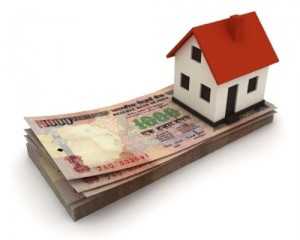 Every one has a desire to own a home or property in India. Pursuing a home loan from a bank or any other financial institution will increase your chances of owning a dream home or apartment in India. Home Loan down payment reduces the lender’s risk and normally range from 15 per cent to 20 per cent of the loan amount. The ultimate advantage of a down payment is to pay the loan amount in a shorter period to reduce the interest rate.
Every one has a desire to own a home or property in India. Pursuing a home loan from a bank or any other financial institution will increase your chances of owning a dream home or apartment in India. Home Loan down payment reduces the lender’s risk and normally range from 15 per cent to 20 per cent of the loan amount. The ultimate advantage of a down payment is to pay the loan amount in a shorter period to reduce the interest rate.
The prior step to seeking the complete loan is to pay an approximate amount of down payment to the loan giver. The down payment has to be paid beforehand. It is just the bridge between the purchase price of the property and the mortgage loan amount. The down payment shows the buyer’s interest, the deal struck and his capability to clear the loan down the years.
There are various reasons as to why a down payment concept is practised between the buyer and the lender;
- It shows that the lender is capable of paying the rest of the amount and the maintenance of the property.
- The bank demands for a down payment in order to test the buyer’s proficiency towards refunding the loan.
- The down payment acts as a bridge between the person paying the amount and the continuity of paying the amount regularly.

- A down payment also guarantees that the banks or the lenders do not undergo a loss due to the fluctuations in interest rates as the amount they lend is lower than the market value of the house. Even if there are interest rate fluctuations, the banks and other financial institutions can recuperate the loss.
- Also prior to the lending process, the down payment is an insurance proof as the borrowers will be aware that violating the process can result in their property as well as their down payment loss.
- A buyer prior to acquiring a down payment should do an intensive research and know the facts and the market changes. Below are some of the facts concerning the down payment.
Few guidelines on how to acquire a down payment;
- It is always wise enough to plan in advance if you want a property. This will give you an idea about the amount of loan to be acquired and the down payment to be given.
- Saving up an approximate amount every month will serve your purpose in times of crisis. Saving up money will help you repay a huge amount in future.
- Also you can opt for lending the money from your near and dear ones.
- If you’re finding it difficult to repay the down payment you can always go in for a personal loan. Based on your cash flow, you can go in for a personal loan and repay the down payment in the earlier stages to avoid an increased interest repayment.
- Other ways of saving enough money is to save your tax refund and try pledging securities to repay the down payment.

Down payments:
- Generally down payment ranges from 15-20 per cent of the overall property value. For instance, a property worth Rs. 20 lakh will demand the down payment of 20 per cent which would come up to Rs. 4 lakh per period.
- There is no restriction on how much a buyer has to pay as a down payment. The basic requirement is that he has to pay the demanded percentage of down payment and if he wishes to clear all his loan in just one go depending on his financial predicament he can as well pay them. Doing this will reduce his interest and will complete his loan in a shorter period.
- It is advisable that a buyer should try and repay his loan within a short period as this can reduce the interest rate of his loan.
- If a property is older enough when compared to other properties, the banks are more hesitant to lend the down payment. The age of the property matters a lot when it comes to lending a loan.
- If a buyer borrows the loan for an older property, there are possibilities that the down payment has to be paid in an increased amount when compared to others.
- It is always better to opt or properties which are not old enough to avoid paying more than 15-20 per cent of the down payment.
- Most of the buyers consider the zero down payments as beneficial. This is a wrong notion, as zero down payment loans are not helpful and are difficult to qualify. Most banks lure the customers by offering zero down payments based on the person’s credit history. Such loans are generally offered for small homes which are very difficult to get.
- Zero down payment loans lead to an increased borrowing with higher monthly instalments and can lead to foreclosure proceedings against the buyer.
- The down payments exclude the miscellaneous costs which comprise of the property tax, transfer charges, registration tax, stamp duty tax and so on. These costs are included in the total loan amount by most of the banks.
Also read:
Home Loan Explained
Home Loan Tips
Home Loan Rates Sinking Downwards
 Every one has a desire to own a home or property in India. Pursuing a home loan from a bank or any other financial institution will increase your chances of owning a dream home or apartment in India. Home Loan down payment reduces the lender’s risk and normally range from 15 per cent to 20 per cent of the loan amount. The ultimate advantage of a down payment is to pay the loan amount in a shorter period to reduce the interest rate.
Every one has a desire to own a home or property in India. Pursuing a home loan from a bank or any other financial institution will increase your chances of owning a dream home or apartment in India. Home Loan down payment reduces the lender’s risk and normally range from 15 per cent to 20 per cent of the loan amount. The ultimate advantage of a down payment is to pay the loan amount in a shorter period to reduce the interest rate.
A very well written and informative article..
A good piece of information for home loan takers.. Kudos to your article..
I agree with the facts.. Good one..
The section where you have briefed about the reasons as to why a down payment concept is practised between the buyer and the lender is well written..
It is always better to make the maximum down payment as it not only helps to bring Home Loan EMI in our budget but also set a budget limit. I am sure even though banks hesitates to give loan in beginning, if you are ready to pay maximum down payment than nominal 20 per cent, every banks will come forward and you can easily make an offer on property you like the best.